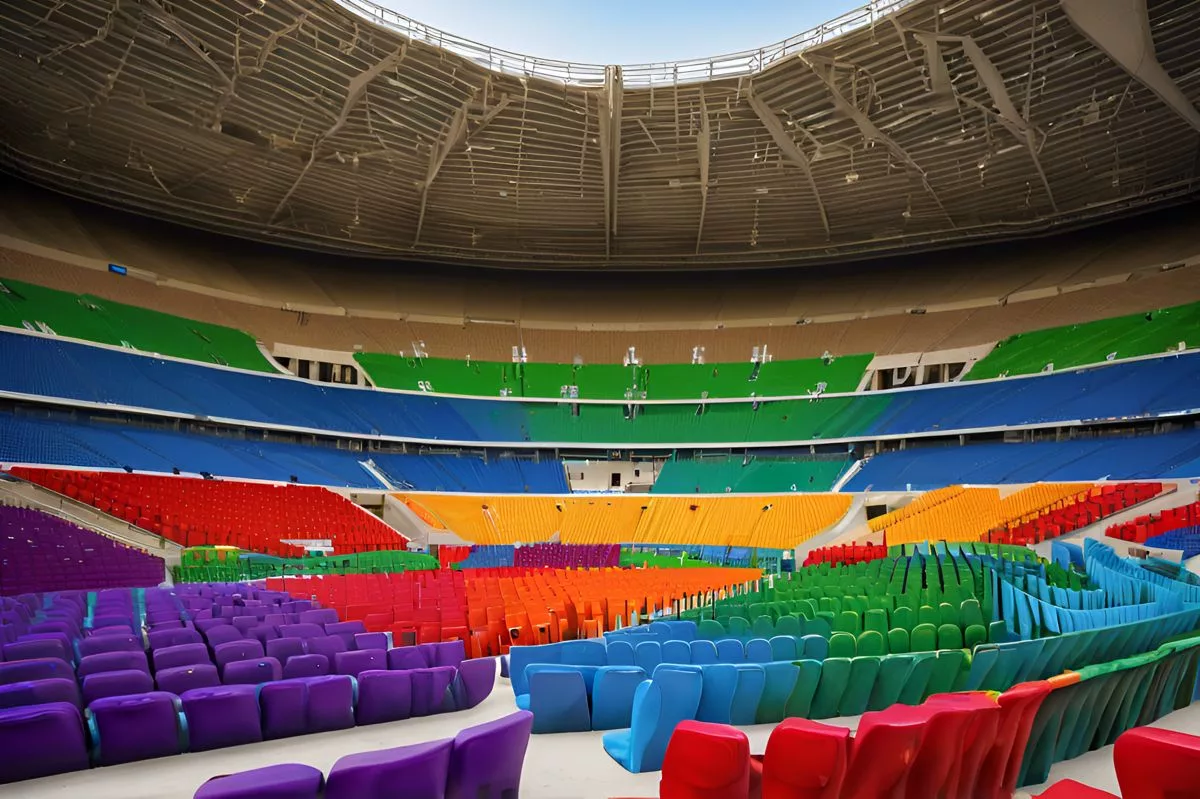Cape Town City FC has launched an exciting initiative called #FreeFootballForAll, giving away 10,000 free tickets to eight home matches at Athlone Stadium. This amazing program aims to bring the community together by making live football accessible to everyone, regardless of their financial situation. By breaking down barriers, the club hopes to create a vibrant atmosphere where fans from all walks of life can enjoy the thrill of the game. This initiative is not just about football; it’s about building a stronger, more united community through the love of the sport.
What is Cape Town City FC’s #FreeFootballForAll Initiative?
Cape Town City FC’s #FreeFootballForAll initiative offers 10,000 free tickets to eight home league matches at Athlone Stadium, making football accessible to everyone. This program aims to break down financial barriers and promote community engagement by allowing fans from all backgrounds to experience live football.
In a time when the commercialization of sports often overshadows its communal essence, Cape Town City Football Club (CTCFC) has rolled out a groundbreaking initiative known as #FreeFootballForAll. Recently announced, this program offers complimentary access to eight home league matches at Athlone Stadium. Partnering with the City of Cape Town, the club plans to provide 10,000 seats per match, breaking down financial barriers and making the beautiful game accessible to everyone in the community.
A Monumental Milestone
Cape Town City FC’s latest announcement has captured widespread attention for its significance beyond just offering free tickets. Football has always played a pivotal role in uniting people across social and economic spectrums. The #FreeFootballForAll initiative embodies this spirit by ensuring that financial constraints do not hinder anyone from experiencing live football. Fans can collect their tickets from the club’s offices at 54 Shortmarket Street or from the Ticket Kiosk outside Athlone Stadium on match days, making it convenient for everyone to participate.
This initiative is not merely a gesture of goodwill; it’s a strategic move to restore football’s communal roots. The move symbolizes the club’s dedication to ensuring that the sport remains an inclusive activity, accessible to fans who might otherwise be excluded due to financial limitations. It’s a statement of intent to reinvigorate the sport’s unifying power.
Reconnecting Through Football
The profound impact of the #FreeFootballForAll initiative on the community cannot be overstated. Football is more than a sport in Cape Town; it is a cultural phenomenon that binds people together. By offering free access to games, Cape Town City FC taps into this communal spirit, providing an inclusive experience that captures the essence of the sport.
The significance of the first match under this initiative, a local derby against Stellenbosch FC on September 25, 2024, cannot be overstated. Local derbies are inherently dramatic, carrying with them local bragging rights and emotional stakes. For Cape Town City FC, ending a four-year winning drought adds another layer of excitement. Free access to such high-stakes matches ensures that the thrill reaches a broader audience, enhancing communal ties and generating widespread enthusiasm.
Moreover, the initiative fosters a greater sense of community engagement by making live football accessible to a more diverse audience. This inclusivity reflects football’s true spirit, where everyone, irrespective of their financial standing, can be part of the excitement.
Navigating Challenges and Strategic Adjustments
The #FreeFootballForAll initiative arrives at a complex time for Cape Town City FC. Both Coach Eric Tinkler and Chairman John Comitis have acknowledged the logistical challenges the club faces concerning home games. Recently, the club decided to shift its primary venue from DHL Stadium to Athlone Stadium, a move driven by necessity and strategic foresight.
Chairman Comitis has openly discussed the financial implications of playing at DHL Stadium, where the club often competes for priority with other events such as rugby matches and concerts. This change to Athlone Stadium promises to be more cost-effective, alleviating the financial strain associated with their previous venue. Coach Tinkler has emphasized the perennial challenge of venue management, given the scarcity of suitable stadiums dedicated solely to professional football in the city.
The shift to Athlone Stadium is part of a broader strategy to make football more financially sustainable and accessible. It underscores the commitment to nurturing the sport within the community and ensuring that logistical hurdles do not impede its growth.
Tinkler’s Vision and Broader Implications
Coach Eric Tinkler has long envisioned a dedicated home stadium for Cape Town City FC. Since taking the helm in 2016, Tinkler has highlighted the necessity of having a consistent home ground to build a strong team culture and fanbase. The club’s struggles to secure a lease for building their own stadium underscore larger issues related to infrastructure and investment in football, particularly in comparison to sports like rugby, which enjoy robust support and attract lucrative events.
Tinkler has also touched upon broader socio-economic issues through his reflections. In a city with limited resources, prioritizing one sport over another can marginalize certain communities. The move to Athlone Stadium represents more than just a logistical adjustment; it is a statement of the club’s intent to make football more accessible to all segments of society, rooting itself deeper within the community.
The broader message here is clear: making football more accessible and inclusive can have a positive ripple effect, fostering a deeper connection between the club and its community. It’s a vision that aligns with Tinkler’s long-term goals for the club and the sport as a whole.
Cultural Resonance and Historical Parallels
The #FreeFootballForAll initiative bears resemblance to historical movements that aimed to democratize access to art and culture. In the early 20th century, efforts like the “Free Theater” movement in Europe sought to make theater accessible to the working class, breaking down class barriers. Cape Town City FC’s initiative follows a similar ethos, striving to eliminate economic barriers in sports.
This initiative also echoes the community-driven movements seen in various artistic endeavors. The Harlem Renaissance, for instance, was not just a cultural explosion but a community-led effort to make art and culture accessible to African Americans. Similarly, Cape Town City FC is using football as a vehicle to foster community engagement and inclusivity.
By drawing these cultural parallels, the initiative underscores the broader impact of making sports accessible. It’s not just about free tickets; it’s about creating a more inclusive and engaged community.
Leveraging Social Media for Greater Impact
In today’s digital age, the role of social media in spreading the word about initiatives like #FreeFootballForAll cannot be underestimated. Cape Town City FC has effectively utilized platforms like Twitter to generate excitement and rapidly disseminate information. Social media provides a powerful tool to engage a broader audience, fostering a sense of community even before fans set foot in the stadium.
The club’s proactive use of social media amplifies the reach of the initiative, ensuring that the message of inclusivity and community engagement resonates far and wide. This digital engagement complements the physical experience, creating a more holistic approach to community-building through football.
A Template for Future Community Engagement
The #FreeFootballForAll initiative could set a precedent for other sports clubs around the world. In an era where ticket prices for major sports events often soar, making them inaccessible to many, this initiative stands out as a model of how sports organizations can give back to their communities. It serves as a blueprint for fostering deeper connections between clubs and their local fanbases.
The potential ripple effect of such initiatives is profound. By making football more accessible, clubs can cultivate a new generation of fans and players who feel a strong connection to their local teams. This sense of belonging and community can have lasting positive impacts, both on and off the field.
Cape Town City FC’s #FreeFootballForAll initiative is more than a project; it’s a revolutionary endeavor that transcends the realm of sports. By offering free seats at their home games, the club rekindles the communal spirit, making football accessible to all. This initiative not only fosters a sense of community but also addresses broader socio-economic divides that often keep sports out of reach for many. In doing so, Cape Town City FC is not just playing football; they are making history, setting a new standard for community engagement in sports.
“`markdown
What is the #FreeFootballForAll initiative by Cape Town City FC?
The #FreeFootballForAll initiative is a program launched by Cape Town City FC that offers 10,000 free tickets to eight home league matches at Athlone Stadium. Its goal is to break down financial barriers and promote community engagement by making live football accessible to everyone, regardless of their financial situation.
How can fans obtain free tickets for the matches?
Fans can collect their free tickets from the club’s offices located at 54 Shortmarket Street or from the Ticket Kiosk outside Athlone Stadium on match days. This setup ensures that it’s convenient for everyone to participate in the initiative.
Why is the #FreeFootballForAll initiative significant for the community?
This initiative is significant as it embodies the spirit of inclusivity and community bonding through football. By offering free access to games, Cape Town City FC aims to unite people across different social and economic backgrounds, allowing everyone to share in the excitement and culture of live football.
When will the first match under this initiative take place?
The first match under the #FreeFootballForAll initiative is a highly anticipated local derby against Stellenbosch FC, scheduled for September 25, 2024. This match is particularly exciting as it carries local bragging rights and emotional stakes for the community.
What strategic changes has Cape Town City FC made in relation to their home games?
Cape Town City FC has shifted its primary venue from DHL Stadium to Athlone Stadium. This decision was driven by logistical challenges and financial implications related to venue management, as Athlone Stadium is expected to be more cost-effective and conducive to the club’s goals of community engagement.
How does the #FreeFootballForAll initiative compare to historical movements for accessibility in arts and culture?
The #FreeFootballForAll initiative draws parallels to historical movements aimed at democratizing access to culture, such as the “Free Theater” movement in early 20th-century Europe. Similar to these cultural efforts, Cape Town City FC’s initiative strives to eliminate economic barriers in sports, fostering community engagement and inclusivity through football.
“`












